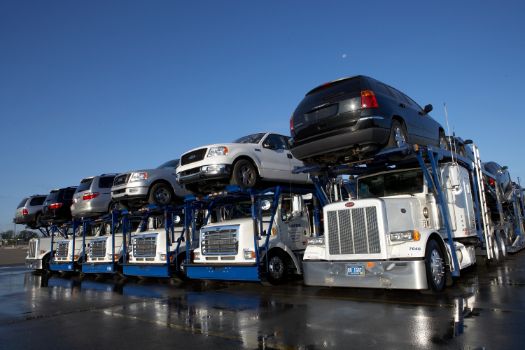The actual cost to ship a car depends on various factors such as distance, vehicle size, transport type, location, and time of year.
The typical range is between $750 and $2,100, with an average car shipping cost of $1,200.

Factors that Affect the Cost to Ship a Car
Shipping Distance
As the shipping mileage increases, the price per mile typically decreases. This is because fixed costs, such as driver pay, insurance, and equipment usage, are spread over a longer distance, leading to a lower price per mile.
Vehicle Size and Type
Shipping costs vary based on the vehicle size and type. Sedans generally cost less to ship than larger vehicles like SUVs, which require more space and may consume more fuel during transport. Luxury vehicles may require additional insurance and special handling, increasing shipping costs.
Vehicle Condition
A car in okay condition generally costs less to ship than a damaged or accidented car. Damaged cars may require specialized equipment or handling, such as a flatbed truck or additional safety precautions, resulting in higher costs.

Shipping Method
Road shipping is often the most economical option. Sea shipping can be cost-effective for international shipments but is generally slower than air or road transport. Air shipping is the fastest but also the most expensive method.
Drop-Off and Pickup Method
Door-to-door service, where the carrier picks up and delivers the vehicle directly to the desired locations, can be more expensive than terminal-to-terminal service, which requires the vehicle owner to drop off and pick up the car at specified locations.
Time of Year
Shipping costs tend to increase in summer due to increased demand as more people move or travel. Conversely, costs are generally lower in winter as demand decreases, but weather-related delays may occur.
Fuel Prices
An increase in fuel prices directly impacts the cost of shipping a vehicle, as carriers must account for the additional expense. When fuel prices rise, shipping costs typically increase as well.

Some Additional Costs & Considerations for Shipping a Car
In-State vs. Interstate and Cross-Country
Shipping a vehicle within the same state is generally less expensive than shipping it interstate or cross-country. This is due to shorter distances, fewer regulations, and lower fuel consumption.
Enclosed vs. Open Transportation
Enclosed transportation, where the vehicle is protected from the elements and road debris in a fully covered trailer, is typically more expensive than open transportation. Open transportation exposes the vehicle to the elements but is more cost-effective as it can accommodate more vehicles per trip.
Luxury or Vintage Cars
Shipping luxury or vintage vehicles may be more expensive due to the need for specialized handling, increased insurance coverage, and the preference for enclosed transportation to ensure the vehicle’s protection during transit.
Add-Ons and Fees
Additional services or fees can increase shipping costs. Examples include expedited shipping, guaranteed delivery dates, or additional insurance coverage. These options can provide extra convenience or protection but increase costs.

Delivery Time Frame
A shorter delivery time frame may result in higher shipping costs. Carriers often charge a premium for expedited shipping to prioritize your vehicle and ensure faster delivery. Conversely, a more flexible delivery schedule may help to reduce shipping costs.
What is the Cost of shipping a Car by Shipping Method?
Passenger Train
Shipping a car via a passenger train is not a common method, and availability might be limited. For example, Amtrak’s Auto Train service offers car shipping between Lorton, Virginia, and Sanford, Florida, with prices starting around $200 for the vehicle, in addition to the cost of the passenger ticket.
Truck
Shipping a car using a truck is the most common method in the United States. Prices can range from $500 to $1,500, depending on distance, vehicle size, and other factors.

Freight Train
Shipping a car via a freight train is less common for individuals and typically used for large-scale transport by manufacturers and dealers. Prices can vary widely, but you can expect costs similar to or slightly lower than truck shipping, as rail transport can be more fuel-efficient.
Cargo Ship
Shipping a car by cargo ship is primarily used for international shipments. Costs can range from $1,000 to $5,000 or more, depending on the destination, vehicle size, and additional services such as customs clearance and taxes.
Air
Air shipping is the fastest but also the most expensive method. It is typically reserved for high-value, luxury, or rare vehicles. Depending on the destination and specific handling requirements, costs can range from $5,000 to $20,000 or more.

Car Shipping Costs: DIY vs. Hiring a Professional
DIY Car Shipping
Fuel: If you’re driving the car, you must account for the fuel cost. This will vary depending on the distance you’re traveling and the fuel efficiency of your vehicle.
Accommodation and Food: If the journey requires multiple days, you must budget for accommodations and food.
Vehicle Wear and Tear: Long-distance driving can add wear and tear to your vehicle, potentially leading to maintenance costs.
Time: Driving the car yourself can be time-consuming, especially for long distances. Consider the value of your time and any time off work you may need.
Trailers: Some companies offer trailers that can tow a car. It is a cost-effective option, but you must know how to drive a trailer.
Hiring a Professional Auto Transport Company

Shipping Costs: Professional auto transport companies will provide a quote for shipping your car, considering factors such as distance, vehicle size, and transportation method.
Insurance: Transport companies typically include basic insurance coverage in their quote, but you may need additional coverage for high-value vehicles.
Convenience: Hiring a professional saves you the time and effort of driving the car, allowing you to focus on other aspects of your move or travel plans.
Reduced Vehicle Wear and Tear: Shipping your car with a professional company reduces wear and tear on the vehicle compared to driving it long distances yourself.
Tips to Save Money when Shipping a Car
Research and Compare Quotes: Contact multiple towing companies and compare their rates and services. This will help you find the most cost-effective option for your needs. Don’t forget to read reviews to ensure you’re choosing a reliable provider.
Choose the Right Towing Service: Different towing options may be more cost-effective depending on your needs. Flatbed towing is typically more expensive than dolly or tow bar towing, so consider the most appropriate method.
Bundle Services: If you also need other services, such as vehicle repair or maintenance, ask if the towing company offers discounts for bundling services together. This can potentially save you money on both towing and additional services.
Membership Discounts: Some auto clubs, like AAA, or insurance companies provide discounted or even free towing services for their members. Check your memberships or insurance coverage to see if you’re eligible for towing discounts.
Utilize Roadside Assistance: If your vehicle is still under warranty or you have a service contract, you may have access to roadside assistance, including free or discounted towing. Check your warranty or service agreement for details.
Plan Ahead: If you know you’ll need towing services for a planned vehicle move, arrange the service in advance. Booking ahead may help you secure a better rate or take advantage of special promotions.
Avoid Peak Times: Towing services may be more expensive during peak times, such as evenings, weekends, or holidays. If possible, schedule your towing service during off-peak hours to potentially save on costs.
Frequently Asked Questions
What is the average cost to ship a car per mile?
The average cost to ship a car per mile varies based on distance. For shorter journeys, the cost per mile can range from $1 to $2, while for longer journeys, the cost per mile decreases, usually between $0.50 to $1. Factors like vehicle size, transport type, and location influence the price.
Can I put my stuff in my car when shipping it?
Some auto transport companies allow a limited amount of personal items in the car during shipping, but it’s important to check their policy beforehand. Excess weight or valuable items may lead to additional fees or be against regulations.
What’s the cheapest way to ship a car?
The cheapest way to ship a car is typically open transport using a truck, which can accommodate multiple vehicles and has lower operating costs. Terminal-to-terminal shipping, where you drop off and pick up your car at designated locations, can also help reduce costs.
How does the price vary when shipping a car in-state and out-of-state?
Shipping a car in-state generally costs less than out-of-state due to shorter distances, fewer regulations, and lower fuel consumption. Out-of-state or cross-country shipping involves longer distances, potentially higher fuel costs, and additional regulations, resulting in higher overall costs.
Why do you need to ship a car?
There are several reasons why someone might need to ship a car. One common reason is relocation; if a person is moving across the country for a job or personal reasons, it might be more convenient and cost-effective to ship their vehicle instead of driving it themselves. Additionally, car collectors or enthusiasts may ship their vehicles to attend events, shows, or auctions. Finally, dealerships and manufacturers often ship cars to deliver newly purchased or leased vehicles to customers or transport them between dealership locations.
Many people also ship their cars because they are not comfortable driving on long journeys. Shipping a car is often economical because shippers ship more than 1 car simultaneously, resulting in lower shipping costs but more shipping time.
How much does it cost to ship a car overseas?
The cost is considerably higher than overland shipping. The costs may not increase when shipping to Hawaii and Puerto Rico, but they’ll be higher when shipping to European or Asian countries. The main reasons behind higher shipping costs include international taxes, air or sea shipping, customs, and other fees that vary from one country to another.